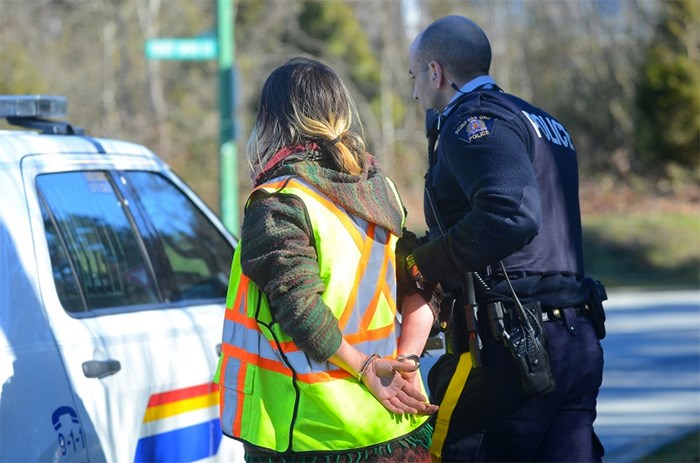 In March, this protester was arrested by police and later charged with mischief for locking herself to a rock truck outside Kinder Morgan’s Burnaby Terminal. Photo Cornelia Naylor, Burnaby Now Photograph By CORNELIA NAYLOR
In March, this protester was arrested by police and later charged with mischief for locking herself to a rock truck outside Kinder Morgan’s Burnaby Terminal. Photo Cornelia Naylor, Burnaby Now Photograph By CORNELIA NAYLOR
The pipeline standoff between B.C., Alberta and our federal government continues to heat up almost as fast as the Arctic Ocean. But none of this oily outrage actually comes as a surprise to you, does it? In many ways, the ongoing tug-of-viewpoints is a reminder of the deep fundamental differences between B.C. and Alberta, most of which are very predictable.
Of course Alberta wants to get its oil to market, and of course B.C. doesn’t want it being piped through to our coast. In other words: you’ve got your Alberta cowboys versus your B.C. hippies and First Nations. Yes, that totally oversimplifies this battle, but, fundamentally, that’s basically it.
B.C.’s environmental opposition should come as a shock to no one, since it could be strongly argued the global environmental movement began right here in B.C.
Greenpeace, the Sea Shepherd Conservation Society, the Green Party of Canada and Dr. David Suzuki, to name some key players, all got their start right here. And many B.C. First Nations are fighting the pipelines in court.
What might be most surprising in this increasingly dirty political punch-up is our federal government, led by a UBC-educated prime minister who shows off a lot of shirtless love for the natural splendour of the West Coast, is doing its absolute damnedest to force the pipeline through — all this from a supposedly forward-thinking government on the subjects of climate change, environmental protection and awareness.
In light of the 2015 Paris Agreement, you would think that Canada would be actively looking at ways to pull us out of the fossil fuel racket and in to the renewable resource sectors. In 2016, Trudeau signed the Paris Agreement with a smile. Late last year, the UN wasn’t smiling back: Canada was called out as one of the biggest feet-draggers of the 196 countries that signed on.
And yet, HSBC, Europe’s largest bank, announced last week they would “mostly stop” funding oil sands, coal power plants and arctic drilling, according to the Financial Post. This follows in line with other large banks, such as ING, who have made similar progressive moves in order to meet the emissions reduction targets set in that Paris Agreement.
John Sauven, executive director of Greenpeace U.K., of course welcomed HSBC’s pledge, saying that, “tar sands are becoming an increasingly toxic business proposition.”
Sigh. Remember when that idea of a new country called Cascadia was floated about on a cloud of marijuana smoke a few years ago? It was a West Coast fantasy that would amalgamate B.C., Washington and Oregon into one sovereign nation. Maybe we should revisit that idea. Washington State governor Jay Inslee is allied with B.C. against the pipelines and recently signed a progressive executive order outlining a strategy to protect the southern resident orca population and Chinook salmon, the orcas’ primary food source.
The orcas don’t recognize international borders. Their territory covers all of Puget Sound and the southern Strait of Georgia. While we aren’t doing nearly enough on our side of the border to protect these two iconic species, stopping the pipelines would be a huge leap in the right direction. That brings us back to the current national debate, and the fundamental question that divides us like the Rocky Mountains: Do we protect the Canadian economy for today, or do we protect the planet and its species for tomorrow?


